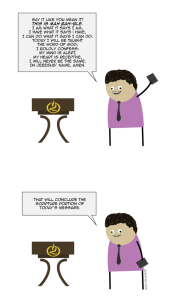Note: FULL SPOILERS for the Season 4 mid-season finale “Too Far Gone” are below.
—–
The Season 4 mid-season finale was quite a blow to the gut, was it not? Any fan of the show has probably come to expect big episodes like this; any fan of the comic probably already knew this wasn’t going to end well. In this week’s episode, we saw the full-on return of the Governor, the death of Hershel, the destruction of the home Rick’s group had built for themselves, the death of the Governor’s new “daughter” as well as numerous other fatal casualties. Throughout all of this the writers of the show have one theme they want you to see come to the foreground of the show: “Can you come back? Are you ever too far gone?”
This theme has been subtly played out in numerous ways beginning in Season 3 with the death of Laurie and now finally culminating in this week’s episode. Now in Season 4, this theme has been explored further. Rick has come back from his fake phone-call answering self, but no longer wants to be responsible for any decisions. Hershel routinely counsels Rick on what it means to “come back” from almost losing yourself. We see Rick beginning to learn this lesson, and helping to ground others who start to become “too far gone,” people like Tyreese who would otherwise go into a berserk rampage. Rick is able to make the decision to cast out Carol, who becomes “too far gone” and emotionally desensitized to death.
Three weeks ago the viewers finally meet the Governor again, now wandering aimlessly after taking in the consequences of all that he had done. In our first episode with the Governor, it almost seemed like he was on the path of redemption. Could it be that even though he was so far gone – to the point that he would needlessly murder countless innocents – he could still come back given the appropriate motivations? Unfortunately, this was not the case as we saw in the next episode how the Governor – or “Brian” – is still completely crazy.
All of these aspects and this theme finally came to a head in this week’s showdown. How did this theme play out?
Can You Come Back?
The mid-season finale climaxes at the “negotiations” of Rick and the Governor. At first, the Governor genuinely seems peaceable and willing to let the prisoners live. Of course as the viewers we know the Governor is crazy and that he understands this “peace plan” will never work. Attempting to reconcile the situation, Rick pleads with Brian and his people for a different option. He wants to let them know that we can all “come back” and we don’t have to do these bad things to survive:
Is this what you want? Is this what any of you want?…Look I’ve fought him before, and after, we took in his old friends, they become leaders in what we have here! Now you put down your weapons, walk through those gates, you’re one of us. We let go of all of it. Nobody dies! Everyone is alive right now, everyone who has made it this far. We have all done worse kinds of things just to stay alive. But we can still come back, we are not too far gone! We get to come back. And I know, we all can change.
This emotional speech from Rick is the “gospel” of the Walking Dead. It is the good news that despite all of the brokenness of this apocalyptic world, despite all of the bad choices you make, you can still come back from those dark places and be a good person. You can do the right thing. Rick has proved it, and so have the people of his group.
Ultimately, the Governor is not willing to accept this gospel. Like the Pharaoh of Egypt, his heart is too hardened and no gospel will change that. The result of the Governor’s unwillingness to accept this gospel is sin and death. His beloved “daughter” dies, his group dies, people in Rick’s group die, and ultimately he dies.
We Have a Greater Gospel
What can we learn from this theme of the Walking Dead? I’d like to suggest four things we can all learn:
1. Sin Brings Death
James 1:15 tells us that “…sin when it is fully grown brings forth death.” The consequences of the Governor’s greed, selfishness and revenge could only bring forth death; the death of his loved ones, the death of those around him, and ultimately his own death. There is no way around the consequences of our actions. While we might not back outrageous decisions like the Governor in our own lives, our sin is outrageous in the sight of God and it comes with outrageous consequences. Because of our sin you, me and everyone around us dies. It is a fact of life.
2. We Have a Greater Gospel
The gospel of the Walking Dead is that you can come back from all of the bad things you have done and do the right thing. You don’t have to be a bad person. While this is certainly a great message, it is not the ultimate message. The ultimate message comes from Christ our King. The Christian God does not just say to us “You can shape up and be a better person.” Not at all! Instead, the Christian God acknowledges that we CAN’T fix ourselves, but shows us the way through Christ. God doesn’t abandon us, he gives us Christ to take on our penalty of death-bringing sin and show us the measure of self-sacrifice and love that should motivate our lives.
But when the goodness and loving kindness of God our Savior appeared, he saved us, not because of works done by us in righteousness, but according to his own mercy, by the washing of regeneration and renewal of the Holy Spirit, whom he poured out on us richly through Jesus Christ our Savior, so that being justified by his grace we might become heirs according to the hope of eternal life. The saying is trustworthy, and I want you to insist on these things, so that those who have believed in God may be careful to devote themselves to good works. – Titus 3:4-8
3. Every Other Gospel Fails
While Rick’s “gospel” sounds nice and is a good message, it ultimately fails. It does not change the heart, but only addresses topical behavior. The reason why the Governor and those who follow him do not want to believe Rick’s gospel is because their desires are completely disoriented. No amount of “we can be at peace and do the right thing” can reorient self-obsessed people like the Governor. What they need is not a change of behavior, but a complete change of heart.
We don’t come back from our bad choices and sin through self-effort and trying harder. We come back by being given a new heart in Christ.
Scripture tells us that when we place our faith and hope in Christ and not in ourselves, God removes our heart of stone and gives us a heart of flesh (Ezekiel 36:26). We don’t need behavior change, we need a heart change and that is exactly what God gives us.
4. Real Change Only Comes in Christ
The Walking Dead is only a TV show. It paints us a picture of a reality where despite everything you’ve done, it is still possible for you to change yourself. But our life isn’t a TV show, and we don’t live in a prison surrounded by walkers. The truth is, we can’t change ourselves. No matter how hard we try, we will always do bad things and offend a holy and righteous God. Thankfully, we don’t have a God who leaves us to our own devices. Christ came and showed us the way, he bought us with his blood, and he left us with the gift of the Holy Spirit. Now, under the motivations of God’s great love for us IN CHRIST, we are able to walk in obedience. In Christ, we are able to put on a new self, an image that is created after the likeness of God and is motivated by true righteousness and holiness (Ephesians 4:24).
Like Rick’s gospel (put down your weapons, surrender and walk through the gates), Christ’s gospel requires a surrender of self and obedience to his commandments. We have a greater message and a greater king than any gospel that is of this earth! Christ doesn’t just tell us, he shows us. He doesn’t leave us, he becomes one of us. He doesn’t leave us empty handed, he gives us himself and His Spirit to teach and guide us. We aren’t just individual survivors, but he brings us into a family to walk with us.
Praise be to Christ for giving us far more than we could ever deserve!
*See below to explain the picture
It is a universal problem that exists in all academic fields: the more one knows, the more one is likely to boast in their knowledge. This is very dangerous territory for the Christian, however. While on the one hand there is room for being thankful for our achievements, we must realize that pride is antithetical to the gospel and therefore there is absolutely no room for it. There should be a difference between how a Christian doctor sees her training in comparison to the non-Christian. All of our knowledge and wisdom should be seen as a gift from God and used for service towards others.
Unfortunately, seminary students in training are not exempt from this area of pride in their knowledge. If anything – because pastors and ministry leaders are held in high esteem by their communities – seminary students might be in even more danger than other professions when it comes to being tempted by pride. As the Apostle Paul tells us, knowledge puffs up but love builds up (1 Corinthians 8:1).
This problem of pride amongst future church leaders is an epidemic that is largely going unnoticed. I myself have suffered and continue to suffer with it, but I am thankful that by God’s grace he has revealed the areas of my heart that have wrongfully been prideful in my seminary pursuits. To that end, I want to list five signs that you might be a prideful seminarian and the corresponding real gospel truths that go along with them.
1) Because you are in seminary, you think the church owes you a ministry position.
Whoever desires a position in ministry desires a noble task (1 Tim. 3:1). However, it is entirely possible to desire a ministry position with the wrong motives. A good sign that you are filled with pride in your seminary pursuits is that you believe simply because you are taking or have taken seminary classes you deserve a position in ministry. This might be subtle in that you work behind the scenes to elevate yourselves above others. Perhaps you subconsciously criticize the way your current leaders do things and think you could do it better. It could also be obvious in the way you talk to your community or your leaders. You might even outright confront your leaders and make demands to be in a leadership position.
The gospel truth is that no one is qualified for a ministry position. It is only by the grace and mercy of God that anyone is qualified to lead. If you want to even begin pursuing qualifications for ministry, start with the guidelines laid out in 1 Timothy and Titus. True qualification for ministry begins at the cross and remains at the cross. Your seminary education should lead you into a deeper understanding of the state of your wickedness and your need for Jesus. It should lead you to a deep desire to serve God’s people with all that you’ve been trained and equipped in. Only then may we begin to think ourselves even remotely ready for ministry leadership.
2) You want everyone to know how much you know, so you needlessly quote things that don’t need quoting.
One of the surest signs that you are a prideful seminarian is that you want others to know how much you know. For you it is not so much important that others understand what you know, so much as that they know you know things (how much wood would a woodchuck chuck…). If you are prideful in this area, you go out of your way to quote a bunch of dead dudes in random conversations. If you’re educated in the original languages, you want everyone to know so you unnecessarily use it (*see the cover picture for this article…ironnyyyyyy!). Your theological knowledge is not a way for you to serve others, but to be superior to them.
The gospel reality is that every single word we read and learn in seminary is to be used for the church. Any gift we are given in the areas of teaching or knowledge are to be used for the Body of Christ, not ourselves (1 Corinthians 12). Nobody cares how much theology you know, the only thing that matters is how you serve your brothers and sisters with what you know. The duty of a ministry leader or pastor is to take their seminary knowledge and make it applicable to the heart of the Christian such that it draws them closer to Jesus.
3) You want everyone to know that you’re in seminary.
Another strong piece of evidence that you are a prideful seminarian is that you want everyone else to know you are in seminary. Because you think seminary makes you a somebody, everyone else needs to know that you are taking seminary classes. You might even try to drop this fact through the art of the #humblebrag, which really means you just want to boast and brag over your brothers and sisters.
The gospel truth is that without Jesus we are nothing (Eph 2:1-10). Jesus makes us a somebody, not our seminary classes or the books we are reading. Again, nobody cares that you’re in seminary if you aren’t using it to serve the church.
4) You are overly critical of your peers.
A guaranteed sign of pride in your seminary education is that you believe it makes you entitled to critique and “offer advice” to your peers…all the time. If this is a problem for you, then you never stop to listen for advice because you’re always the one giving it. You speak when you’re not spoken to and offer criticisms when they’re not warranted. You probably critique your leaders behind their backs. Every time you learn something new in the classroom you twist conversations to make it apply to someone else. Your own heart isn’t being changed because you’re too busy trying to change others.
The hard gospel truth is that every piece of knowledge you learn in the classroom needs to impact your own heart before it can impact someone elses. Your time in seminary should be a time of increased listening and heart transformation (Prov. 12:15), not increased criticism of your peers. Don’t be a know-it-all. Instead, confess your sins to your peers and show them how your heart is being changed by your seminary education.
5) You constantly want to best yourself over your seminary brothers and sisters.
While there is always room for healthy competition, the seminary classroom can quickly turn into a place of unhealthy and unhelpful boasting. Because you are prideful, you want to be better than your peers in the classroom. You don’t like it if they get better grades than you, so you come up with excuses. You probably brag about your opportunities to speak outside the classroom. You want everyone to know that you’re smart (or so you think), so you find ways inside and outside the classroom to boast in your knowledge.
The gospel truth is that the seminary classroom should be a place for humility and encouragement of one another. There is no room for boasting in our knowledge or education – is that not contra-gospel? Instead, our seminary classrooms should be marked by a deep sense of humility and grace, constantly seeking to build one another up (1 Thess. 5:11). You should not seek to prove your intelligence, but build up your peers that they might be strong in their own pursuits. If you’re getting ministry opportunities that your peers aren’t getting, then you should be building up your peers in preparation for those experiences. If we can’t be graceful towards one another in the classroom, then how are we going to be graceful to the men and women in the church that we serve?
If you struggle with pride in any of these areas, my encouragement to you is not to feel down and out. Jesus died for prideful sinners like us. Read, meditate, and pray Philippians 2:1-11. Pick up a copy of Valley of Vision and pray through “Man A Nothing” and “Humility in Service.” They will wreck your face. Confess your sins to your church, and resolve to serve them with your whole heart.
Grace. I am so undeserving of grace. Why me, oh Lord?
Consider not I, who would at a young age feign faith yet know you not, rejecting your daily mercies. Consider not I, who at my core am nothing but a lying, thieving, adulterous, man-hating, selfish, prideful and covetous man. For what reason am I deserving of your grace and mercy? Why would you, while I am consciously rejecting and blaspheming your very name, choose to open my eyes and ears to see the beauty of the gospel? “Oh wretched man that I am! Who can save me from this body of sin and death?”
Surely there are others more deserving. Consider instead the social worker who fights daily for justice for children, yet she remains far from you. Consider instead the politician who gives their life towards advocating peace, yet he does not know you. Consider instead those who give up everything to bring relief to people in need, yet they have not experienced your love. Consider instead the doctor serving in low-income areas, who provides medical care to the neglected, yet remains entirely resistant to the very idea of your existence.
Why me, oh Lord? Why would you choose me as your “vessel of mercy”, while I was running farther and farther from you? How could you bring me so near to your holy throne, a filthy and stained sinner like me?
Is it true, as your Word says, that the heart of man is entirely wicked and that we have all gone astray? Is it true, my God, that there is “not one who does good” and that our righteous deeds are like “filthy rags” to you? Who then is worthy to receive your grace?
Indeed my God and Savior, there is not one who is deserving of your grace. For if we could earn your grace, it would no longer be grace. How could we then be so far from you that we would reject the very idea that “while we were yet sinners, Christ died for us?”
What love is this, that it would please you to bring filthy and dirty people like myself into your presence? How great a love that shows mercy to those who “act ignorantly in unbelief.” For in us you are pleased to show your goodness and mercy, “But I received mercy for this reason, that in me, as the foremost, Jesus Christ might display his perfect patience as an example to those who were to believe in him for eternal life.”
I contemplate then the cost of such grace. For as loving and gracious as you are my God, you are also the unlimited and just judge of all creation. How great are you, that you would consider my soul greater than yourself. What kind of God would love a filthy man like me, to allow my sins to nail your perfect Son to the wooden cross?
What kind of God would sacrifice himself for his rebellious creation? There is only one, our mediator Christ Jesus. And just as you then paid the perfect sacrifice “once and for all”, so now you are continually making propitiation and turning away the wrath of the Father towards our sin.
Your grace, Oh Lord. I am so undeserving of your grace. Yet I am so thankful for giving me “eyes to see, and ears to hear.” How can I not now, after weighing the cost of such love, not live my life entirely for you? Oh Lord, melt the hearts of my fellow men, and if it pleases you to do so, send me out to make you known among them.
Bible reading is both an art and a science. The Holy Scriptures are meant to pierce all of our heart and all of our mind. We cannot neglect the expressive, emotional aspect the Bible carries into our lives. These things are important as we draw nearer in our relationship to Christ. However, we cannot neglect the intellectual and rational minds our God has given us; Christianity is a thinking-man’s religion.
I’m not sure if there isn’t one person who doesn’t struggle with giving either their heart or their mind more weight than it is due. I know this is something I regularly struggle with. On the one hand, we can turn Christianity into a feel-good self-improvement program that is all about positive feelings. With no backbone and having never been encouraged to actually think about the text, people misrepresent or leave the faith in countless numbers.
On the other hand, it is entirely possible to academize and intellectualize the faith. Pursuing only knowledge, people lord their education over others while failing to magnify our great God and apply it to their lives. These are two extremes that we must take care to avoid at all costs.
It is my intention in this post to provide some insight as to how I attempt to avoid either extreme. The things I list in these posts will inform future articles and I will likely reference them often.
1) Everything Must Point to the Gospel
I am so thankful for gospel-centered preaching. It is the food that nourishes, supplies and helps further Christ’s church today. Living in a time post-Christ, we have been gifted and blessed with God’s full revelation in Jesus. Because of this, when we read the Biblical text it is essential we read it in light of the life, death and resurrection of Christ. There is no aspect of the Scriptures that shouldn’t inform our view of Christ in some way.
This is easy for most of the New Testament. The gospels all tell of the life and redemptive work of Christ, and the remaining epistles all continually point back to Christ. The area we struggle with this the most is in the Old Testament. Since this is pre-Christ and often appears to be a series of unrelated stories, we so easily fall into the trap of forgetting the text is all about God-man.
A helpful text for this is Luke 24:27, “And beginning with Moses and all the Prophets, he interpreted to them in all the Scriptures the things concerning himself.” The key words here are all the Scriptures. There isn’t one text in the Old Testament that doesn’t inform us to Christ’s work on the cross, and we must therefore engage all of our faculties in understanding the Old Testament in light of the gospel.
Instead of figuring out what the Old Testament stories tell us about Jesus, our first inclination is to instead read ourselves into the story. So we ask questions like “What does this mean to me today?”or “What does this tell me about God working in my life?” These are healthy questions to ask, and can bear good fruit in our lives. These questions however should not be our starting point.
It is instead necessary for us to first ask Christ-centered questions such as “What does this passage tell me about Christ?” or “Where is Christ in this Old Testament account?” Starting with such questions will diminish our desires to read ourselves into the text, and will instead elevate Christ’s position to its proper place.
There are two examples of this that will be helpful for this discussion. The first of these is the story of Joseph and his brothers. Having been completely abandoned and betrayed by his brothers, Joseph is sold into slavery. The great climax of this story is when Joseph says “As for you, you meant evil against me, but God meant it for good…” (Genesis 50:20). We like this text, and we use it in hard times as reassurance that God will bring us out of whatever hole we are in (pun intended). But is this really the meaning of the text? Is this text about how God will be faithful to us and do good things for us?
On the contrary, this text is centrally and entirely about Christ. It is a shadow of the life and sufferings Jesus will endure on our behalf. Like Joseph, Christ would also come and declare his rightful place among the nations – and be rejected for it. Like Joseph, Christ would be betrayed and abandoned by those closest to him – Judas and the other disciples. Like Joseph, Christ would be restored and elevated amongst the people.
Another common example in the Old Testament would be the account of David and Goliath. We all know how the story goes, the little shepherd boy kills the great Goliath with nothing but a slingshot and a sword (after Goliath is knocked unconscious, of course). Today the temptation is to understand this story as allegory. We read ourselves as David and Goliath as all of our life’s problems! If we are as faithful as David, God will help us overcome our difficulties.
Again, this is not the meaning of the text. Arriving at this conclusion is the result of asking the wrong questions. What does this text tell us about Christ? Where is Christ in this story? Similar to Joseph, David is a shadow of Christ in the Old Testament. We are not David – Christ is. Like David, Christ is the unlikely hero who will fight the battle that we could not fight. Christ takes our place, as did David for the Israelite army. It is crucial that this is our starting point for this story. We no longer read it as what God will do for us, but instead we read it as what God has already done for us through Christ.
Before I wrap this thing up, I must briefly mention our understanding of the New Testament. While it is easier for us to see Christ in the New Testament – especially the gospels – we still often start with me-centered questions. The same Christ-centered and gospel-centered approach must apply to the New Testament.
Helpful for our understanding is a passage again from the book of Luke. Luke records the following comment in his gospel from early on in Jesus’ ministry, “When the days drew near for him to be taken up, he set his face to go to Jerusalem” (Luke 9: 51). In the Gospel of Luke, this is only 9 of 24 chapters into the gospel letter. From the beginning Jesus had a mission, and his mission was to come to this earth to take our place and pay a punishment we deserved in our place. Known as the Fathers “Great Commission” to the Son, the prophet Isaiah records a similar idea centuries before Christ walked the earth: “I will make you as a light for the nations, that my salvation may reach to the end of the earth” (Isaiah 49:6). When we read the New Testament, even in the accounts in the gospel letters prior to the crucifixion, we must read and understand the text in light of the gospel.
That’s all for today. I quickly realized while writing this that what I intended to be one post must be broken up into four or five posts. Come back tomorrow for more thoughts on how I (try to) read my Bible.







